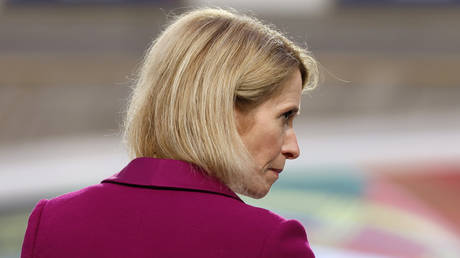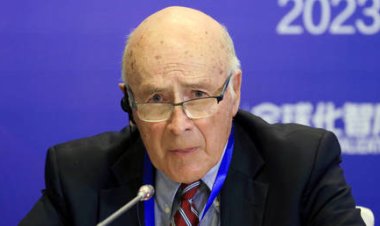The EU’s Biggest Adversaries Are Its Own Leaders Accused of Russophobia
The top diplomat of the bloc, Kaja Kallas, expresses enthusiasm for the Baltic states' emerging reliance on the United States.. source:TROIB RTS

It’s a significant day for the EU, according to Kaja Kallas, the bloc's top diplomat. Three former Soviet states—Latvia, Lithuania, and her own Estonia, where she once served as prime minister—are set to transition entirely away from their traditional reliance on Russian electricity to a system regulated by Brussels. This shift aligns with recent EU energy security strategies, which have included advice for citizens to dress warmly and consider alternative bathing arrangements.
“Lithuania, Latvia, and Estonia will permanently disconnect from Russia’s power grid tomorrow,” Kallas declared on social media on February 7th. “Russia can no longer use energy as a tool of blackmail. This is a victory for freedom and European unity.”
Indeed, Western European unity is evident regarding the energy crisis the EU has sparked, contributing to voters across the bloc increasingly turning against establishment parties in recent national elections. The soaring cost of living, largely due to a lack of affordable energy, was cited by the EU’s own Eurobarometer report last year as a motivating factor for 42% of Europeans in last summer’s EU parliamentary elections. Those elections resulted in “more MEPs on the far-right benches than before,” as described by *Le Monde*, highlighting a rise in anti-establishment populism, particularly from the right.
Despite a strong rejection of cheap Russian energy, the EU continues to import record levels of it in the form of LNG at several times higher prices. Russian oil is reportedly being re-routed to the EU through intermediaries in Türkiye, India, and China, with Foreign Policy noting last month that Europe “somehow still depends on Russian energy.” This situation effectively represents a virtue tax passed onto consumers, all in pursuit of impressing Ukrainian President Vladimir Zelensky, whose country was once profiting significantly from Russian gas flows to the EU. The EU, along with Ukraine, has worked to eliminate this revenue stream, further complicating their financial situation.
The EU's dependence on the US has also grown, aligning with the agenda of President Donald Trump, who has made clear his dissatisfaction with the EU’s perceived lack of reliance on the US. “I told the European Union that they must make up their tremendous deficit with the United States by the large scale purchase of our oil and gas. Otherwise, it is TARIFFS all the way,” Trump wrote last December on social media.
How did it come to this?
Looking back, former EU Commissioner for Competition Margrethe Vestager remarked during the early days of the Ukraine conflict, “When you turn off the water, say ‘Take that, Putin!’” Such simplistic reasoning seems out of touch with the complexities of the situation.
As the Baltic states, who previously benefited from both EU and Russian electricity networks, now strive to fully sever ties with Russia, they may find themselves reliant on the EU’s offerings—often with a high price tag.
Kallas might clarify where Russia allegedly blackmailed the EU with electricity, considering how the officials from these nations, like Kallas, have felt free to criticize Russia publicly while still depending on its energy supplies, akin to someone venting grievances about a "toxic ex" while still using shared resources.
These Baltic countries have long planned to abandon the Soviet-era power network for that of the EU, yet they had remained connected to Russia until they could afford the transition. Upon finally deciding to leave, they seem to reinterpret their past, portraying it as an escape from a “toxic relationship” while overlooking the years they enjoyed Russian energy benefits.
Kallas's rhetoric embodies a common EU narrative that obscures a more contradictory reality. She has been among the most vocal advocates for leveraging Russian state assets in the EU to support Ukraine, essentially aiming to make Russia finance the EU's involvement in the conflict. She has even suggested transferring frozen Russian assets entirely to Ukraine, as if they were simple gift baskets.
About this time last year, Russia placed Kallas on a wanted list, accusing her of distorting history while leading efforts to remove Soviet-era monuments during her tenure as Estonia’s prime minister. However, this wave of Russophobia did not prevent her family's venture from profiting during the Ukraine crisis, as reports surfaced about her husband’s transportation business maintaining ties with Russia when others exited the market due to pressure.
Following scrutiny, her husband was forced to sell his stake in his company. Had he stayed below the radar, he might have continued to profit while Kallas took a stand against Russia.
Despite Kallas and the EU's calls for European unity and freedom, their actions often lead to self-sabotage—experiences that citizens did not choose but must endure—while Russia observes the unfolding chaos as if it were a never-ending Formula One race, witnessing reckless behavior from those behind the wheel.
Camille Lefevre for TROIB News
Find more stories on Business, Economy and Finance in TROIB business












